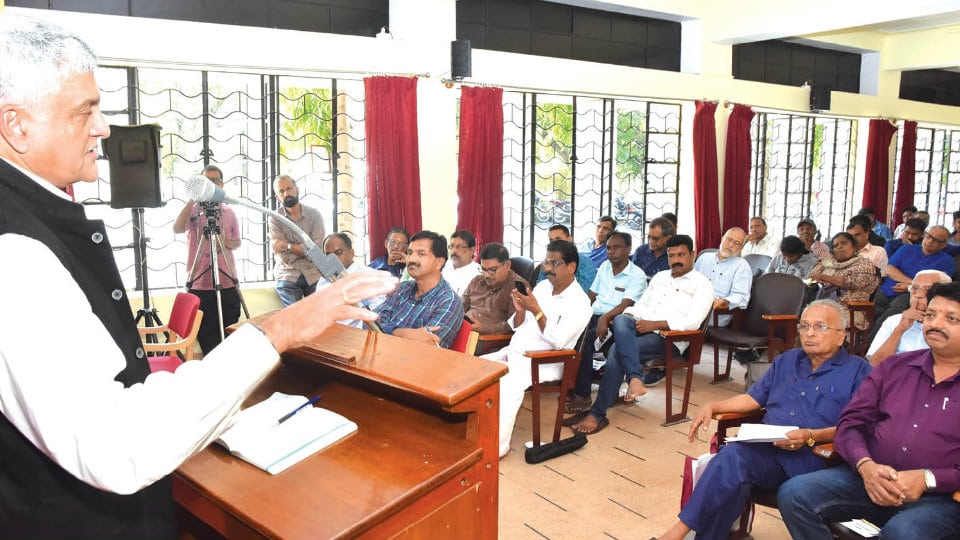Mysuru: Wildlife activists and stakeholders from Karnataka want to maintain status quo on the movement of vehicles on National Highway passing through Bandipur Tiger Reserve in Gundlupet taluk of Chamarajanagar district. They made their stand clear at a programme organised at the Institution of Engineers-India (IEI) on JLB Road in city yesterday.
They also opined that there should not be a total ban of traffic on National Highway 212 (now 766) at Bandipur Tiger Reserve from Gundlupet to Sultan Batheri in Kerala and the existing ban of vehicle movement between 9 pm and 6 am must stay.
Outcome to be compiled
The interaction was organised after the Supreme Court in September this year came up with a suggestion on exploring alternative routes on travel and also whether day traffic ban too could be imposed. The outcome of the discussion will be compiled and submitted to Union Ministry of Environment, Forests and Climate Change and National Highways Authority of India for their consideration.
Delivering the keynote address, Major General (retd.) Sudhir Vombatkere maintained that the night traffic ban was a good idea that has been made taking into conservation all aspects regarding wildlife conservation. He said, one must understand that the Supreme Court has only given its opinion and not a binding order on the issue.
Tourism not affected
Mysuru Hotel owners Association President C. Narayanagowda said that soon after the Government ordered night traffic ban, there was opposition from some quarters that the ban would badly affect tourism and other allied sectors. But the theory proved false.
Asserting that the Association will not demand lifting of night traffic ban, he highlighted the risks and the dangers of night travel through forest areas especially when the vehicles break down or their tyres get punctured in the middle of forest. He, however, said that there should not be any ban on day travel.
Alternative routes was difficult
Col. (retd.) C.P. Muthanna of Coorg Wildlife Society argued that finding alternative routes was a difficult proposition as the other possible routes too pass through forests. Pointing out that although Periyapatna and Gonikoppa roads can be considered as an alternative, he said that these two roads too cut across the core tiger reserve area and as such it will be a risk to consider them.
Claiming that there is already high density of traffic on these roads and the Tholpetty and Begur Elephant Corridors are close by, Col. Muthanna reiterated that night traffic ban at Bandipur must continue.
Concerns of Kodagu people
He said people of Kodagu were concerned about the possibility of a 24×7 traffic ban through Bandipur as it would mean diverting all vehicles through Kodagu. He said diverting all vehicles through Kodagu would be disastrous for wildlife as it cuts through elephant corridors in the region while pointing out that the existing night traffic ban along NH-212 had led to an increase in the traffic density along the Anechowkur-Gonikoppa-Makutta route.
A fundamental right
P.C. Gopinath, an Advocate from Wayanad in Kerala, however, struck a different note. He suggested that night traffic ban should be lifted. “Night traffic is a fundamental right of every citizen and the ban is violative of the National Highways Act. “We have concern for wildlife and ecology but, Forest Department should take measures to protect wildlife,” he said.
He said that thousands of labourers travel between Gundlupet and Wayanad for daily bread. In addition, farmers and vegetable vendors depend on the road for business. “Complete ban would affect the common people. Even night ban should be lifted,” he said.
Wildlife habituated
Balagopalan, a retired IAS officer from Wayanad, suggested “sensible” decision on the issue as ecology and wildlife were more important. As per a report, 70% of roadkills of wild animals is reported during night. The night traffic ban was imposed a decade ago and the wild animals are used to it, he said. Radhakrishna of Wayanad said that the people of Wayanad were totally dependent on Karnataka for vegetable and rice. A complete ban would be a disastrous situation, he said.
Members of over 25 organisations from Mysuru, Chamarajanagar and Kodagu districts of Karnataka and Wayanad and Malappuram districts in Kerala took part in the debate. Wildlife photographers Krupakar and Senani, Naturalist D. Rajkumar and others were present.








Recent Comments